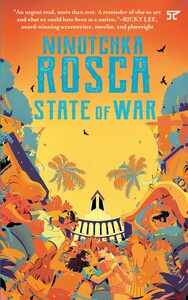Take a photo of a barcode or cover
This book has been parked on my shelf since my friend loaned me her copy a couple of years ago. At the time, I wasn't able to see the book through - it's the kind that requires careful attention, otherwise you'll miss certain details in the foreshadowing that will make sense in the third and final part, The Book of Revelations.
Philippine historical fiction is my top favorite genre and I'm honestly annoyed at myself for not having read this novel sooner when it's so gripping and illuminating. Of course the author added her own twists and turns to the events that did take place during the Spanish rule, WWII, the Japanese occupation, and Marcos dictatorship but I still find that the best way to remember our past is through stories such as this.
State of War revisits our colonial past and unveils the hodge-podge that is the Filipino identity. Through the stories of Anna's ancestors, as told in the The Book of Numbers, interwoven with those of Adrian and Eliza's, we trace the many cultural and sociopolitical changes that our country has undergone at the hands of our foreign oppressors - shaping it into the Philippines we know today.
What struck me most was Luis Carlos' journey in the resistance and how it's always been peasants who have liberated our country despite - or perhaps, because of - their marginalized state. It's absurd how the ruling elite will yap about independence and freedom when they have always been complicit in the suffering of our people (exhibit A: Laurel's puppet government). In the end, the same guerrilla movement that shed blood to gain our freedom was betrayed by the white man, proving once again that we are in a constant state of war - the facies of our enemies just change. To this day, we remain victim to U.S. imperialism.
Speaking about the present, Ninotchka Rosca's prose is as timely as ever. This is the same plea 0f my generation:
This is a must-read for all Filipinos.
(My ex said it's required reading in Ateneo and I hope more universities and schools add this in their syllabus.)
Philippine historical fiction is my top favorite genre and I'm honestly annoyed at myself for not having read this novel sooner when it's so gripping and illuminating. Of course the author added her own twists and turns to the events that did take place during the Spanish rule, WWII, the Japanese occupation, and Marcos dictatorship but I still find that the best way to remember our past is through stories such as this.
State of War revisits our colonial past and unveils the hodge-podge that is the Filipino identity. Through the stories of Anna's ancestors, as told in the The Book of Numbers, interwoven with those of Adrian and Eliza's, we trace the many cultural and sociopolitical changes that our country has undergone at the hands of our foreign oppressors - shaping it into the Philippines we know today.
What struck me most was Luis Carlos' journey in the resistance and how it's always been peasants who have liberated our country despite - or perhaps, because of - their marginalized state. It's absurd how the ruling elite will yap about independence and freedom when they have always been complicit in the suffering of our people (exhibit A: Laurel's puppet government). In the end, the same guerrilla movement that shed blood to gain our freedom was betrayed by the white man, proving once again that we are in a constant state of war - the facies of our enemies just change. To this day, we remain victim to U.S. imperialism.
Speaking about the present, Ninotchka Rosca's prose is as timely as ever. This is the same plea 0f my generation:
...God, if there's one, don't let all of us die (the house! the house!), allow one to survive and wear down the eternity of the dictator; if he lives to a hundred, let us last a hundred and ten, long enough to spit on his grave and drown his corpse in the lagoon of our contempt; if he lives to two hundred, let us survive two hundred and ten, just long enough to fertilize the gardens with the shit of his memory; and if he's thinking of living through his sons' sons, allow us to outlive them all, just for the pleasure of being alive when he dies, before we bury them in the amnesia of our relief at his passing.
This is a must-read for all Filipinos.
(My ex said it's required reading in Ateneo and I hope more universities and schools add this in their syllabus.)
slow-paced
Plot or Character Driven:
Plot
Strong character development:
Complicated
Loveable characters:
Complicated
Diverse cast of characters:
Yes
Flaws of characters a main focus:
Yes
State of War started off really strong, I was captivated by the writing. The descriptions were vivid and the characters were well-constructed; the storytelling reminded me of Isabel Allende's A Long Petal of the Sea. The beginning of the book introduces three characters: Adrian Banyaga, Eliza Hansen, and Anna Villaverde. They are prominent characters, though their page-time wasn't the longest. Divided into three chapters/sections: the second chapter, the Book of Numbers, takes up the biggest portion of the book, spanning the Spanish, American, and Japanese occupation in the Philippines until the Marcos era. It is also the richest in history and culture. My enjoyment levels of this portion went up and down a lot due to the characters and their actions, I guess I was just more interested in Adrian, Eliza, and Anna and this was a break in the momentum. There's magical realism incorporated into the story as well but in my case this made things a bit confusing and took me quite a while to wrap my head around. Despite these, I still thought this book was well-written, emotional, and thought-provoking; extremely symbolic. A must-read for Filipinos.
i found this book very hard to read, not just because of the usage of really deep words, but also because im not used to reading books by filipino authors because 9 times out of 10, its gonna be about philippine history. and yes, this book is one of those. from the start of the book of acts to the beginning of the book of numbers, i was confused. so confused, and i still am. there were so many characters and so many points of views that it was hard to keep track even though i was writing notes. but everything came to understanding when luis was finally born. i started getting interested in the story.
as i finished this book, i couldn't help but think of what mad uncle ed about waging war against our own kind. it reflected so much on the condition of the philippines today. currently, we're at war with ourselves, and i won't even be surprised if just like the characters in the book, we revolt against the government. it really opened my eyes to the political bullshit thats been going on, and has been going on for decades now.
as i finished this book, i couldn't help but think of what mad uncle ed about waging war against our own kind. it reflected so much on the condition of the philippines today. currently, we're at war with ourselves, and i won't even be surprised if just like the characters in the book, we revolt against the government. it really opened my eyes to the political bullshit thats been going on, and has been going on for decades now.
What a book. Though, I'm quite sure that not all would be too fond of how it was written. It was quite difficult to get accustomed to, especially in the first few chapters. But beyond that, it was a very interesting read, a quick rundown of the country's history from dealing with foreign colonizers until we ourselves are fighting each other.


